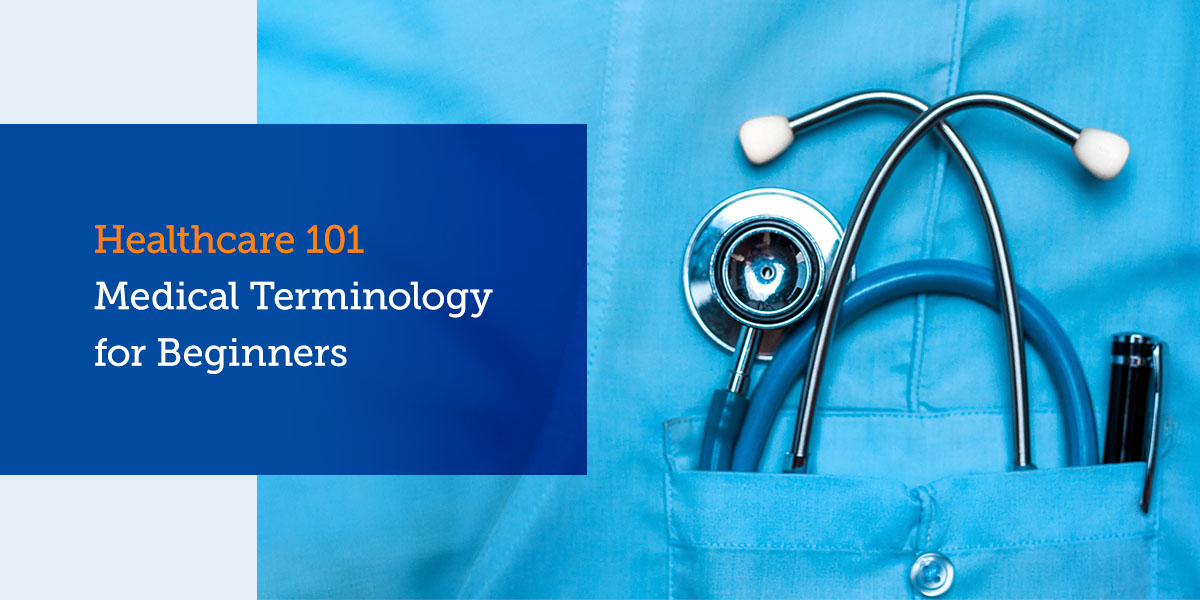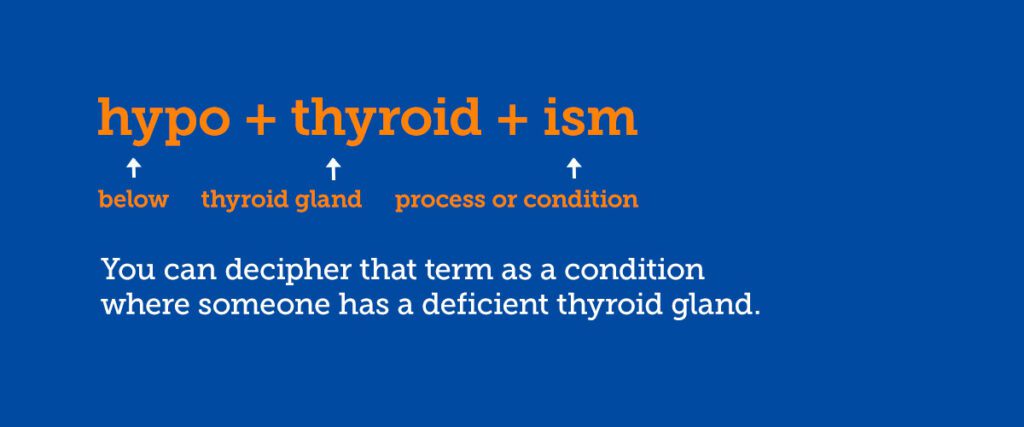Healthcare 101: Medical Terminology for Beginners

Whether you’re starting work as a medical professional, a patient in a doctor’s office or considering a healthcare career, it can sometimes be hard to follow an experienced doctor’s explanations. That’s because medical terminology uses unfamiliar terms to the average person. Even the simplest words and phrases can sound like a foreign language. If you can relate, this article on basic medical terminology for beginners is sure to help!
How to Study Medical Terminology
If you think medical terminology sounds like another language, that’s because it is! Most medical terms have Greek and Latin roots, sometimes strung together like tongue twisters. So, there’s no reason to feel bad if you find medical terms confusing, as they come from a foreign language.
Still, you can learn some tricks to unlock the meaning of these complex terms. Medical terms have three essential components — root words, prefixes and suffixes. Some terms only consist of a root word and suffix or prefix and root word. When all three components are together, the typical structure is prefix + root word + suffix. Once you learn the meanings of common medical prefixes, suffixes and root words, you can decode medical terms by breaking them into their different components and understanding them through association.
For example, if you break the term “hypothyroidism” into its prefix, root word and suffix, you get hypo + thyroid + ism. The prefix “hypo” means below, beneath or deficient. Thyroid is the root term for the thyroid gland, while the suffix “ism” refers to a process or condition. Through association, you can decipher that term as a condition where someone has a deficient thyroid gland.
Since the root words form the foundation of a medical term’s meaning, it makes the most sense to start there. As such, here are some common root words in medical terminology.

Most Common Prefixes/Prefix Change
Medical prefixes have various purposes. Some designate when or where the condition or procedure occurs, while others indicate a condition’s behavior or characteristics, such as the size, function or quantity. With that in mind, here are some medical prefixes indicating position, location or direction:
- Ab-, which means away from
- Ad-, implying toward
- Acro-, which demonstrates top or extremities
- Ante-, signifying before or forward
- Anti or anter-, indicating opposing or against
- Ap- or apo-, meaning away from or detached
- Cirum- or peri-, which means around
- Co, con or com, indicating together or with
- De-, which signifies down, from or lacking
- Dia-, meaning through or apart
- Ecto-, which means outside
- Epi-, meaning upon
- Extra- or extro-, which indicates beyond or outside of
- Inter-, which means between
- Intra-, meaning within or inside
- Intro-, signifying into or within
- Meta-, which suggests after or beyond
- Pre- or pro-, meaning before or in front of
- Poro-, which means pore, opening or passing through
- Post- or postero-, which signifies after, following or behind
- Sub-, meaning under
- Topo-, illustrating place or position
- Trans-, which means through or across
Some common medical prefixes signifying when a condition occurs or its speed and rate of activity include:
- Ante-, meaning before.
- Brady-, signifying slow.
- Chron-, indicating a long time.
- Re-, which means again.
- Retro-, which shows back or backward.
- Tachy-, which signifies fast.
As for medical prefixes that have to do with size or quantity, these include:
- A- or an-, signifying absence or without.
- Bi-, di- or dipl-, meaning two, twice or double.
- Equi-, indicating equal.
- Hemi- or semi-, which means half or half of.
- Macro-, signifying large.
- Meso-, which indicates middle size.
- Micro-, which means tiny or small.
- Mono-, meaning one or single.
- Multi- or poly-, which signifies many.
- Pan-, indicating total or all.
- Quad-, which means four.
- Tri-, meaning three.
- Ultra-, indicating excessive or beyond.
Medical prefixes concerning procedural or conditional behavior or characteristics include:
- Acu-, meaning sharp or severe.
- Chemo-, which represents chemical.
- Encephal/o-, which refers to the brain.
- Estro-, meaning female.
- Fibro-, which refers to fibers.
- Hemat/o-, referring to blood.
- Hyper-, meaning above, excessive or beyond.
- Hypo-, which indicates below, beneath or deficient.
- Secto-, meaning to cut.
Most Common Suffixes/Suffix Change
In general, medical suffixes refer to a procedure or a pathology, condition or function. As with prefixes, many of the suffixes help provide context to root medical terms, even though they aren’t unique to medical terminology. Some common medical suffixes of pathology, condition or function include the following.
- -algia: pain.
- -ary or -ic: pertaining to.
- -ase: enzyme.
- -ation: process.
- –cele: hernia.
- -clasis: to break.
- -constriction: narrowing of.
- -dilation: to expand or stretch.
- -dynia: pain or discomfort.
- -edema: swelling or inflammation.
- -ema: condition.
- -emia: related to blood.
- -esis, -iasis or -osis: abnormal condition or disease.
- -eurysm: expanding or widening.
- -genic: causing.
- -globin: protein.
- -ia: condition.
- -icle: small, possibly microscopic.
- -ism: process or condition.
- -itis: swelling or inflammation.
- -ly or -lysis: breakdown, deterioration or separation.
- -mania: obsession.
- -mortem: death.
- -oma: mass, tumor or cyst.
- -one: hormone.
- -paresis: weakness or failing.
- -partum: birth.
- -pathy: emotion or disease.
- -phasia: speech.
- -phylaxis: protection.
- -pnea: breathing.
- -poiesis: formation.
- -rrhag, -rrhage or -rrhagia: burst or excessive flow.
- -rrhea: discharge.
- -schisis: to split.
- -somnia: sleep.
- -spasm: muscle contraction.
- -stasis: to control or stop.
- -tropia: to turn.
- -tropin: to trigger.
- –uria: urine.
Suffixes related to medical procedures include:
- -ectomy: removal.
- -graphy: recording of something.
- -opsy: display of.
- -pexy: fixation.
- -plasty: mold or shape.
- -scopy: examination.
- -stoma or -stomy: create a new opening.
- -tomy: the process of cutting or making an incision.
- -tresia: opening.
- -tripsis: rub or crush.
Popular Terms
Now, it’s time to put some of those root words, prefixes and suffixes together! Here are a few of the most common medical words to help you get started.
- Analgesic: Pertaining to the absence of pain, or a substance that takes the pain away.
- Appendectomy: Surgical removal of the appendix.
- Bradycardia: A condition where the heart beats too slowly.
- Carcinoma: A cancerous mass, tumor or cyst.
- Chronic: A condition that lasts a long time.
- Osteoporosis: A condition where a person’s bones are too porous.
- Pericarditis: Inflammation of the tissues surrounding the heart.
- Thoracotomy: Surgical incision into the chest cavity.
Interested in Entering the Healthcare Field? Request More Info Here!

If this crash course on medical terminology has piqued your interest in working in the healthcare field, AIHT is an excellent place to begin that journey. AIHT equips students with all the essential skills to thrive in applied health sciences. Feel free to request more information on how you can enter the healthcare field with AIHT!




